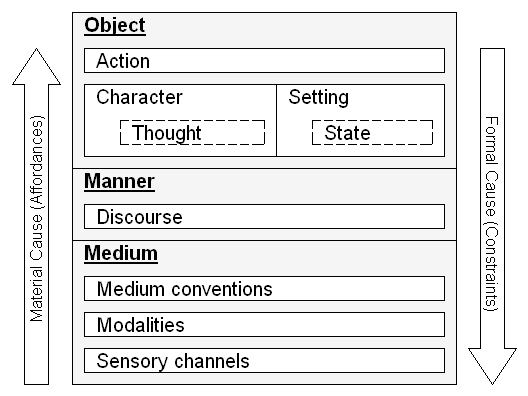
A neo-Aristotelian poetics for interactive narrative.
So far, I have limited myself to those elements that have been carried through the evolution of this poetics to Mateas. However, the notion of manner was dropped relatively early in this development. Since the focus has been on describing interactive drama, this has been easy to ignore. We can simply assume that, as the player is assuming the role of a character, the manner is one of enactment.
Aristotle's definition of manner is very brief:
For the medium being the same, and the objects the same, the poet may imitate by narration--in which case he can either take another personality as Homer does, or speak in his own person, unchanged --or he may present all his characters as living and moving before us (Aristotle 1961, Chapter III).
We can see here that the manner is how the story is presented, but it is independent of both the medium and the object. The main distinction Aristotle makes is between narrated and enacted manners. For example, the play Romeo and Juliet has an enacted manner: it presents the characters "as living and moving before us". However, this "enacted" play can still be embodied in different media: as a script, as a live performance, as a film.
If the same Romeo and Juliet story was instead written as a novel told from Juliet's nurse's point of view, then the story would have a narrated manner. This novel could be made into a film, as film can present both enacted and narrated manners (as explored in more detail below). Thus, the same object (the story--including events, characters, and settings--of Romeo and Juliet's ill-fated romance) and the same medium (film) can have a different manner (enacted or narrated).
Aristotle also distinguishes between two kinds of narration--an omniscient narration verses a limited, character-filtered narration. In either form, we find our experience of the action is provided only through the particular point of view of the narrator. This narrator may be unreliable; the filtering character may be fallible. The narration may be very overt, in which the narrator constantly evaluates or comments on the events and characters of the story.
Narration is not itself an event in the story it conveys, even when the narrator is a character in the story. This is essentially the difference narratologists make between the story--the chronological events of the action--and the discourse--the telling or presentation of those events (Chatman 1978). The discourse conveys the story to us, but it may comment on that story, focus our attention on certain events over others, omit events, foreshadow or flashback to previous events, provide "backstory" information, etc. There is usually a difference between the discourse and story timeframes--it might take an hour to read about the events that happen to the characters in seconds, or a ninety minute film might show story events that occur years apart.
Although this difference between the story and the discourse is less obvious for enacted narratives, the distinction can still be made (Chatman 1990). For example, film can present things from a particular point of view. A narrator can be established through such conventions as using voice-overs, point-of-view shots, and having the narrating character present in all scenes. Two different directors can tell the same story in different manners using the same film medium depending on how they use scene cuts, pacing, staging. lighting, etc in order to reveal, highlight, or comment upon the action. Although easily overlooked, the discourse--how the story is presented--is clearly important. And it is, in fact, present in all forms of narrative. Mark Stephen Meadows (2003) goes so far as to argue that the perspective from which the events are relayed is even more essential to narrative than the events themselves.

We have seen that Aristotle's manner is, essentially, narratology's discourse. This discourse is what we experience by materially constructing the conventions of the medium. And from the material of the discourse, we construct the world and events of the story based on the perspective we are provided. In reverse, the events and the world of the story constrain the form of the discourse, which in turn formally determines how it is embodied in a particular medium.
|
Argax Project : Dissertation :
A Rough Draft Node http://www2.hawaii.edu/~ztomasze/argax |

|
Last Edited: 25 Feb 2011 ©2006 by Z. Tomaszewski. |